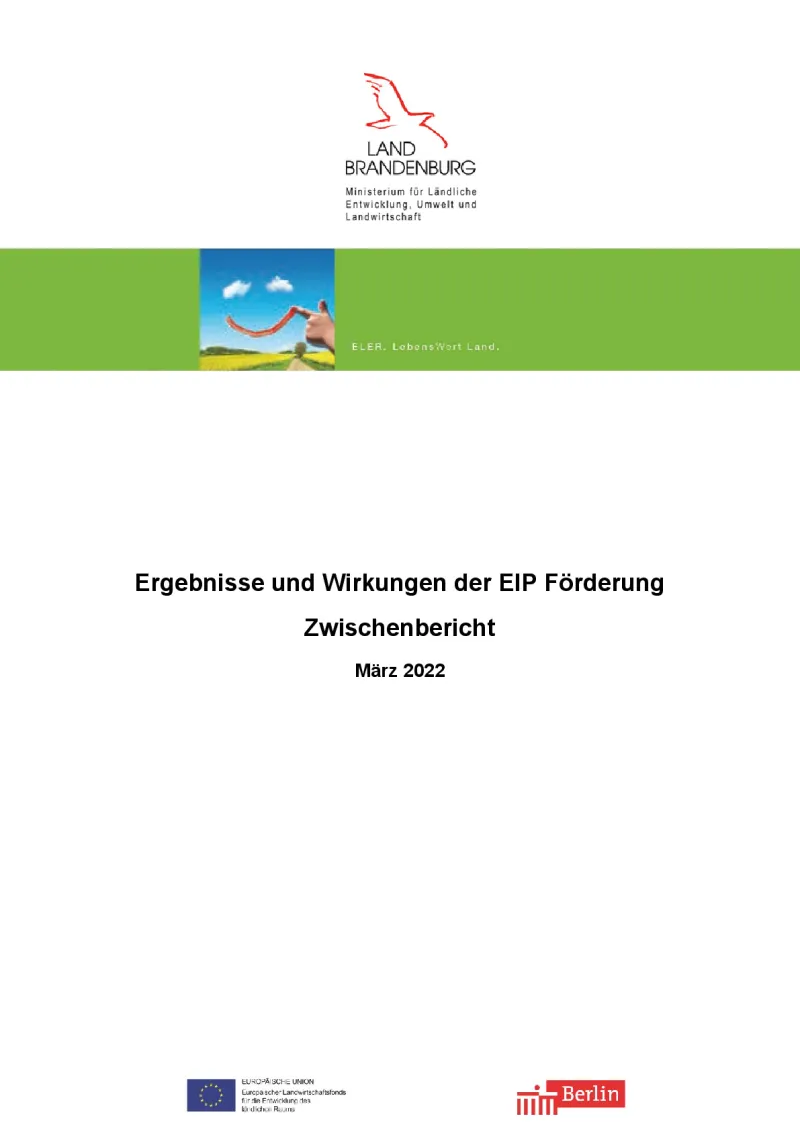Results and effects of European Innovation Partnership support
- Evaluation
- Jobs, Growth and Equality in Rural Areas
- Agricultural Productivity
- Sustainability
- Research & Innovation
The ongoing evaluation of the Rural Development Programme (RDP) focuses on the results and impact of the European Innovation Partnership (EIP) support in Brandenburg, Germany.
- Germany


The evaluation is commissioned by the German Ministry of Agriculture, Environment and Climate Protection of the Federal State of Brandenburg (MLUK) and carried out by an external evaluation team consisting of BonnEval and the Office for Agricultural and Village Development. This first interim report covers the period 2016-2020.
The ongoing evaluation of the RDP focuses on the results and impact of the EIP support in Brandenburg. In the context of the ex post evaluation, the analysis of these results should help to answer the Common Evaluation Question 30: To what extent has the RDP contributed to fostering innovation?
The key question is whether the supported innovation processes delivered their specific results and led to higher performance and sustainability in the programme area or if such an effect can be expected, at least in the medium term. This first interim report examines the possible impacts based on the first five completed EIP projects. Thus, first conclusions and recommendations can be drawn for the further design of the support measures. Other completed projects will be evaluated gradually.
In terms of methodology, a bottom-up approach is chosen for the evaluation based on the analyses of each completed project and respective conclusions. First, it is examined at the project level if the implicit or explicit specific objective of the project is achieved and if the intended or other results are achieved. Information is collected including project descriptions, practice sheets and final reports. The 'project description', 'practice sheet' and 'final report' for each project are presented on the EIP website of MLUK.
The maturity level of the results is then assessed based on the concept of Technology Readiness Level (TRL) in order to analyse the steps taken or still to be taken after the project completion to achieve a broad practical application. The classification into a TRL (from 'Level 1-Basic research' to 'Level 9-Proof of successful use of the qualified system') is carried out by the evaluator, confirmed in case of doubt by an Operational Group (OG) partner from the research.
The dissemination of results is assessed using final reports, internet and literature research, and information provided by project coordinators. The OG members and technology dissemination organisations were also consulted (e.g. via interviews) on the results used beyond the OG.
In terms of limitations and challenges influencing the validity of the results, it is mentioned that an evaluation would ideally need to be carried out as part of the ex post activities in 2025/2026 when the results achieved may have been further developed and disseminated. However, there would be a risk that the contact persons of the OGs would no longer be available after project completion or they would not remember the results. In addition, findings from the evaluation would come too late for redesigning or reshaping funding conditions or project selection criteria.
The overall finding of the evaluation shows that the EIP measure has not yet contributed to “large-scale rural development”. This is supported by the following more detailed findings:
- Achievement of specific objectives. The five projects have achieved their objectives. The EIP measure can thus be assessed as successfully implemented in the design and confirms that cooperation research can, in many cases, “be regarded as the most effective and important form of interaction between research and business”.
- Impact potentials. The five projects have a potential impact on productivity and/or sustainability in agriculture or on meeting the societal demands in agriculture. The initiated innovation processes could lead to “reasonably large changes” if they were widely applied in practice.
- Different maturity levels at project completion. There is a lack of application maturity of the achieved results upon and after the completion of the projects (as of 2021), which was one reason why the potential effects of the five successfully completed projects have not yet occurred.
- Dissemination of results. The EIP cooperation partners' publications have been very lively and diverse. The MLUK's EIP website has supported the dissemination; however, the website does not provide an analysis of the reasons for discontinuing the project 'LandLogistics' ('Practice sheet' section). In addition, there is no systematic incorporation of results after project completion in AKIS, which is still very fragmented for farmers.
- Changing framework conditions that can prevent or delay potential effects include the COVID-19 crisis, uncertainty of potential investors about future market requirements, war in Ukraine and African swine fever.
Author(s)
Susanne Stegmann, BonnEval